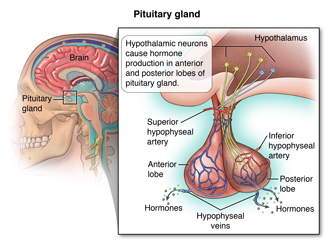The Pituitary Gland
 |
| Click image to enlarge |
The pituitary gland is sometimes called the master gland of the endocrine system. This is because it controls the functions of many of the other endocrine glands. The pituitary gland is small. It is about the size of a pea. It is located at the base of the brain. The gland is attached to the part of the brain called the hypothalamus by nerve fibers and blood vessels. The pituitary gland itself has 2 lobes:
-
Anterior lobe
-
Posterior lobe
Functions of the pituitary gland
Each lobe of the pituitary gland makes certain hormones.
Anterior lobe
-
GH (growth hormone). This influences growth during childhood. And it helps keep muscles and bones healthy in adults.
-
Prolactin. This stimulates milk production in the female breast. It's role in men is uncertain.
-
ACTH (adrenocorticotropic hormone). This regulates the adrenal glands.
-
TSH (thyroid-stimulating hormone). This regulates the thyroid gland.
-
FSH (follicle-stimulating hormone). This regulates the ovaries and testes.
-
LH (luteinizing hormone). This regulates the ovaries or testes.
Posterior lobe
-
Antidiuretic hormone . This is actually made in the hypothalamus and stored in the pituitary gland. It controls water and sodium balance in the body.
-
Oxytocin. This helps the uterus to contract during labor and childbirth and stimulates the release of milk during breastfeeding. Oxytocin also may play a role in bonding and trust, especially between parents and children.
Online Medical Reviewer:
Raymond Kent Turley BSN MSN RN
Online Medical Reviewer:
Ricardo Rafael Correa Marquez MD
Online Medical Reviewer:
Sabrina Felson MD
Date Last Reviewed:
3/1/2023
© 2000-2024 The StayWell Company, LLC. All rights reserved. This information is not intended as a substitute for professional medical care. Always follow your healthcare professional's instructions.